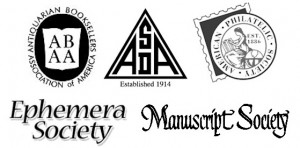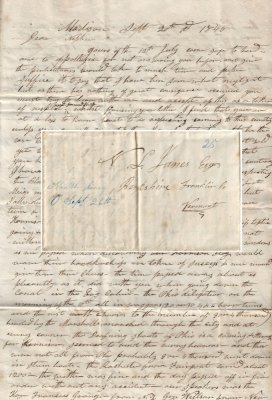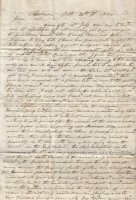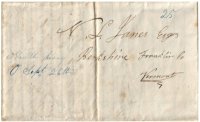Kurt A. Sanftleben, LLC
B. F. Fuller
1840 – A political letter describing America’s first major nation-wide campaign rally, held in Erie, Pennsylvania for William Henry Harrison, the Whig candidate for president in the 1840 election
List price has been discounted for this show.
$800
Item Details
Madison, Ohio, 1840, Letter
Very Good
1840 – An exceptional political letter describing America’s first major nationwide campaign rally, which was held in Erie, Pennsylvania, for William Henry Harrison, the Whig candidate for president in the 1840 election
This three-page stampless folded letter measures 16” x 12” unfolded and is datelined “Madison [Ohio,] Sept. 20th 1840.” It was sent by B. F. Fuller to his nephew, N. L. Janes at Berkshire, Vermont. It bears a manuscript postmark, “North Perry / O Sept. 26” and a “25” rate mark, both in blue ink. In nice shape. A transcript will be provided.
In this letter, Fuller describes the Whigs’ campaign rally celebrations while disparaging those of the “Locos,” i.e., the Democrats. It reads in part:
“I did not attend the celebration at Fort Meigs . . . but I attended at Erie. . .. We rigged out a six horse team & eighteen joy fellows rode in the wagon. Harrison songs and hurrahing for Harrison was the chief topic going & coming. We met with but very few who was not willing to go it for old Tip – the women at the doors & windows as we passed, when discovering our Harrison flag, would wave their handkerchiefs in token of success & we would give them three cheers. . .. Time passed as way . . . as pleasantly as it did with you going down the Canal in the Log Cabin. The Ohio delegation on the morning of the 10th, all in wagons (20 or 30 4 & 6 horse teams and the rest with 2 horses to the number of 3 or 4 thousand) headed by the Marshals, marched through the city and at every corner the deafening shouts of Ohio is a coming & Hurray for Harrison, seemed to rend the very heavers. . .. Probably 3 or 4 thousand went down in Steamboats. . ..
“The Locos met by themselves, a poor crippled crew, and with the greatest exertion possible their numbers . . . was about 1-5 [thousand.] Their wagons was filled with hickory brush. We enquired of them why they did not bring Slippery Elm instead [and] they were speechless. . ..
“We calculate sometime this week to raise a pole with a Harrison banner on the North Ridge at Branches. The pole is to be 100 feet in height. We think there will be quite a gathering. [There will be speeches on reform,] & we can sing a great many Harrison songs. . .. I have heard the news from Vermont [and] rejoice that there is so much real democracy there, not Van Buren democracy, for that is spurious – but the old fashioned that of ’76 – and I guess we will show you some of the same genuine kind in Ohio next Nov.”
“Old Tip” was the Whigs’ affectionate nickname for Harrison, who had defeated the Shawnee Nation at the Battle of Tippecanoe in 1811. And, no doubt, one of the campaign songs bellowed endlessly by his supporters was Tippecanoe and Tyler Too, which references both Harrison and his vice-presidential running mate, John Tyler.
Log cabin imagery played a major role in Harrison’s campaign. After the Democrats attempted to ridicule him as an old country bumpkin who did nothing but sit on his cabin porch drinking hard cider, Harrison championed both Hard Cider and Log Cabins as part of his winning campaign strategy.
During the campaign, the Whigs sarcastically referred to Democrats as “Locos,” a reference to a faction of Jacksonian and Van Buren Democrats, the Locofocos, formed in opposition to the New York Democrats’ political machine, Tammany Hall. The word referred to the name for a friction-match used by the Jacksonians to light candles in order to continue an evening political meeting that Tammany men tried to break up by turning off the gaslights. The Whigs, however, turned the word into a widely-used derogatory slur which they claimed came from the combination of loco and focus, symbolizing the Democrats’ “focus on folly.”
Although the Whigs had already selected Harrison to be the party’s nominee in December 1839, mass meetings were later held in Baltimore, Columbus, and other cities, culminating with a boisterous celebration in Erie, Pennsylvania, which had been advertised for weeks and had no precedent in American politics. On September 10, 1840, huge crowds assembled on a square in the city. Leading up to the event, steamers disgorged throngs of Whig passengers at the city docks, and roads leading into the city were choked with wagons and ox carts. Even more Whigs descended upon Erie on foot or by horseback from not just the Midwest, but the entire nation. Interestingly, the Democrats met in Erie on the same day to confirm Martin Van Buren as their candidate, but in comparison to the Whig celebration, it was sparsely attended and lackluster.
(For more information, see Casselman’s “The Whig Convention of 1840 in Erie” at the Erie Reader website, and Freeling’s “William Harrison: Campaigns and Elections” and “William Harrison: The American Franchise” at the Miller Center website.)
This appears to be the only first-hand description of America’s first major presidential campaign rally by one of its participants to have survived. At the time of listing, nothing similar is for sale in the trade, the Rare Book Hub shows no similar descriptions have ever appeared at auction, and OCLC shows none are held in institutional collections.
#10466
Kurt A. Sanftleben, LLC
Kurt A Sanftleben
2129 General Booth Blvd Suite 103-311
Virginia Beach, VA, 23454
United States
Phone: 757-716-3336
Cell: 571-409-0144
Featured Catalogue
Visit Website
Specialities
Paper Americana

More Information
Booth 23
Shipping and Returns
PAYMENT METHODS ACCEPTED - We accept Checks, Money Orders, and Credit Cards (Visa, MasterCard, American Express, Discover) via PayPal. Interbank transfers via Zelle are free and may be necessary for high-dollar-value transactions. Other domestic and international bank transfers may be possible for an additional fee. Institutions, well-established customers, and ABAA members may be invoiced; all others are asked to prepay. INSTITUTIONAL PURCHASES - We appreciate institutional constraints when it comes to complying with fiscal years, acquisition rules, foundation requirements, and donor concerns, so we’re always willing to hold items for a reasonable time for you to meet organizational purchasing, funding, and billing requirements. TRADE DISCOUNTS - We offer reciprocal trade discounts (sale items included) to known book, ephemera, and postal history dealers when paying by check or money order. Dealers unknown to us may be asked to document their status. DOMESTIC SHIPPING - Unless otherwise specified, orders are normally shipped free of charge by our choice of USPS Media, First Class, or Priority Mail. If requested, other shipping (e.g., UPS, FedEx, USPS Express Mail, etc.) shipping is at cost. INTERNATIONAL SHIPPING - Orders are normally shipped at cost via FedEx, USPS Priority International Mail, and USPS First Class International Mail. RETURNS AND REFUNDS - We accept returns for full refund less shipping for any reason provided the item purchased is returned to us within 14 days and in the same condition as sent. Please notify us in advance of any return shipment.
Open Times
If you'd like to discuss any of these items via Zoom, send me an email at [email protected] or a text at 571-409-0144 to set up a meeting.


